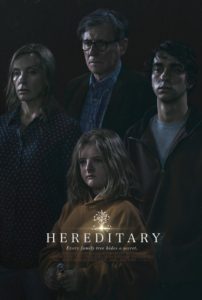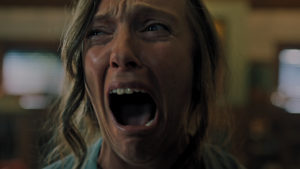Film Review: Creepy “Hereditary” Is Missing a Few Strands of Narrative DNA
Written by: Christopher Llewellyn Reed | June 27th, 2018

Hereditary (Ari Aster, 2018) 2 out of 4 stars.
A beautifully shot, acted and designed film that nevertheless falls far short of early promise, Hereditary, the debut feature from writer/director Ari Aster, offers a plethora of impressive visuals that ultimately amount to less than the sum of their spooky parts. In the central role of Annie, a woman both daughter and frazzled matriarch, Toni Colette (Glassland) delivers a brilliant performance that (almost) carries the movie over its more nonsensical passages. She’s given solid support by Gabriel Byrne (Lies We Tell), Ann Dowd (Hedgehog), Milly Shapiro (making her screen debut), and Alex Wolff (Patriots Day), the ensemble coming together as one in eerie unity. Unfortunately, their impressive commitment is not enough to overcome the deficiencies of script.
As the film begins, Annie and her clan are burying grandma, dead after a slow decline in which neither she nor her daughter appear to have reconciled after years at odds, though they shared a house. Annie is an artist who makes miniatures, and one of the best mise-en-scène choices of the movie is how Aster returns, time and again, to these models as harbingers of terror; they are in fact, the very first images we see, leading through a plan of the home as its inhabitants prepare for the funeral. The dead safely put away, Mom, Dad (Byrne), son Peter (Wolff) and daughter Charlie (Shapiro) go about the business of living. Not so easy, not so fast, as Charlie – a girl with some kind of behavioral disorder – is haunted by the one no longer there, both figuratively and, perhaps, literally. Something wicked this way lingers, as Annie may be seeing things, too.

Just as the ghost is making its presence known, the movie takes a turn for the unfamiliar (all to the good) and repellant (less so). A road accident – complete with close-up of the results – upends the narrative, and before long madness and mayhem creep into every corner of the story. With the arrival of a new friend (Dowd) for Annie – made at a 12-step group for fellow grief-sufferers – who may not be what she seems, the insanity builds even more. For a good while, I loved Aster’s control of tone and pacing, until the atmosphere outpaced the screenplay and I stopped caring. Some of the seeds of my discontent were sown by that accident, deeply unpleasant as it is, but also by later plot threads so tangled in the weaving of the master tapestry that the result is a frayed mess. Still, my disappointment would be less bitter if the first half weren’t so strong, and I commend Aster for the effort, especially his direction of actors, all of whom shine. May his next film inherit the best of Hereditary‘s DNA and discard the rest.

